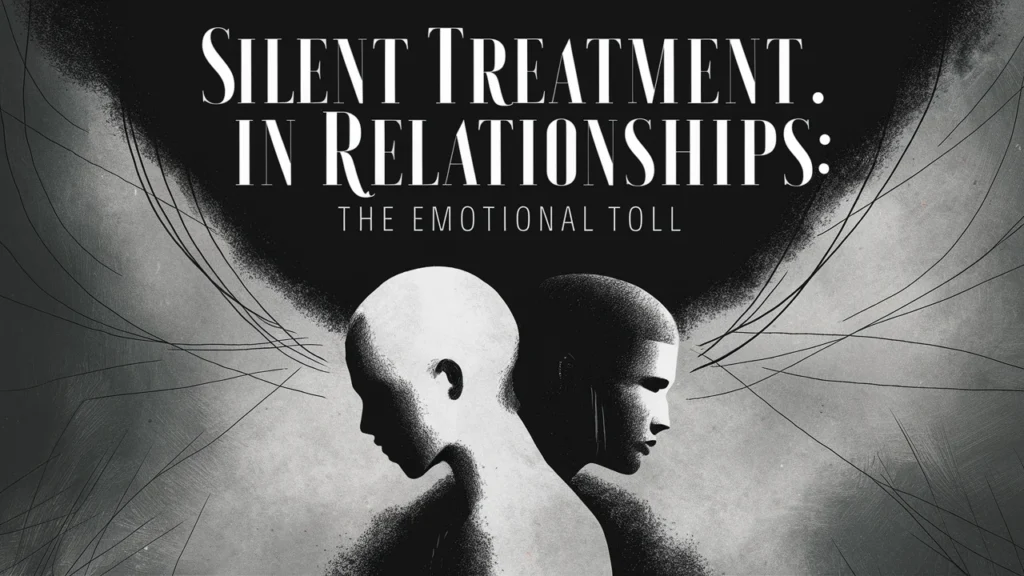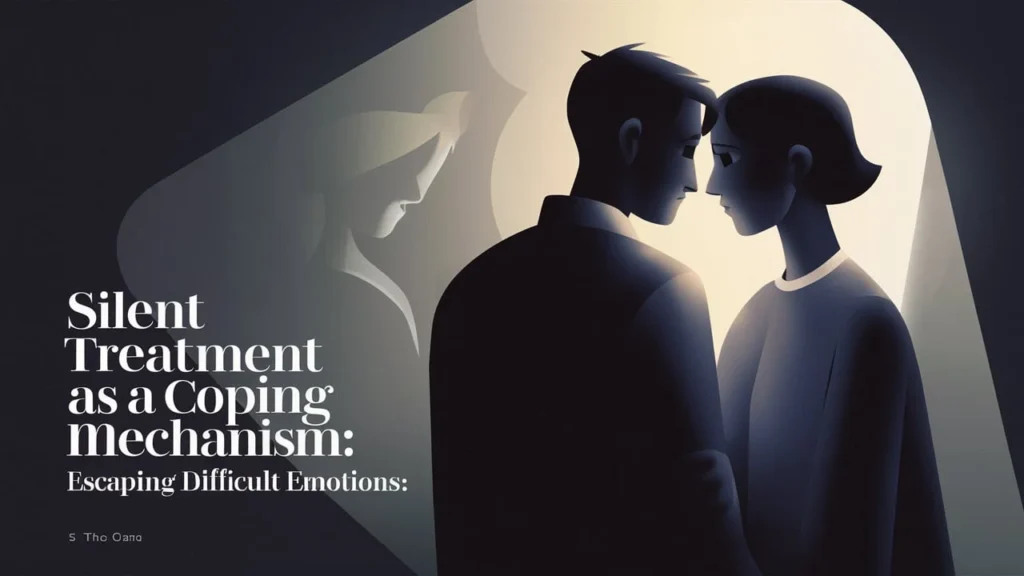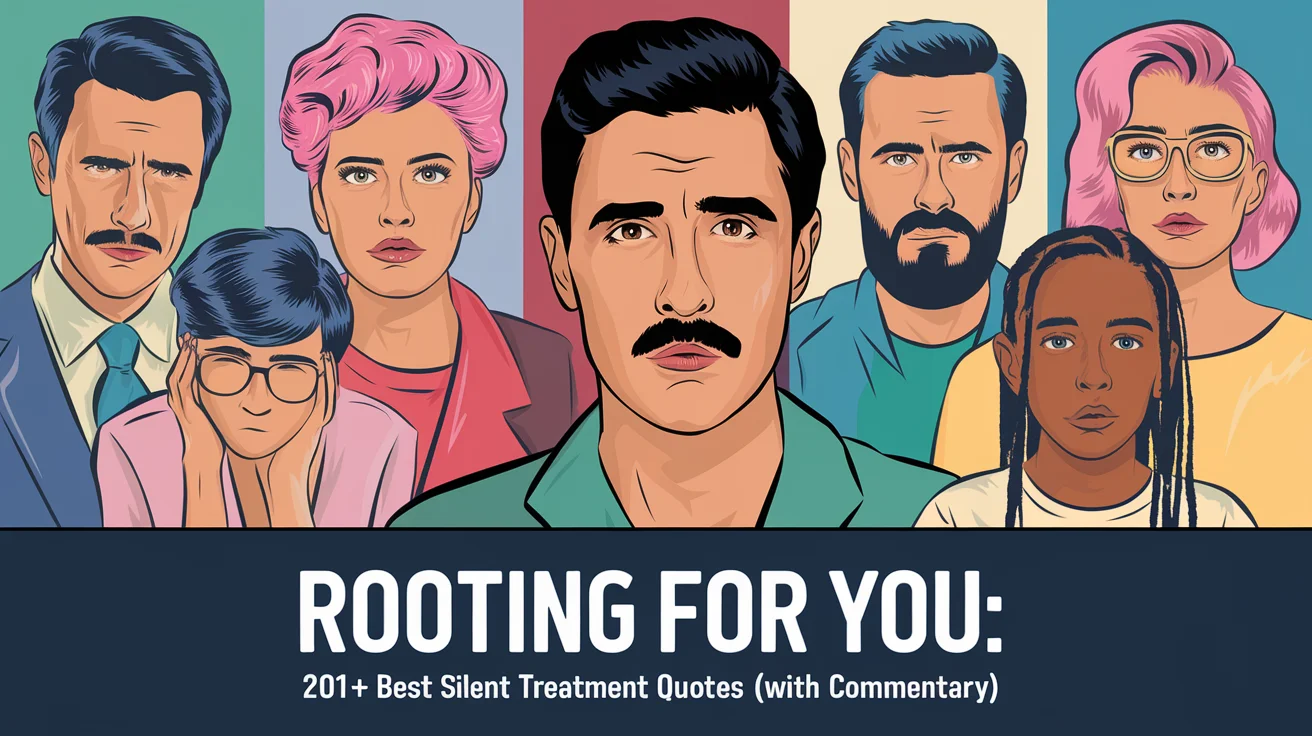Discover the most relatable and thought-provoking Silent Treatment Quotes. Explore emotions, relationships, and the power of unspoken words! The silent treatment, often used as a form of communication in difficult relationships, speaks volumes without saying a word.
Whether it’s a tactic for controlling a situation, punishing someone, or simply expressing frustration, silence can be a powerful weapon. However, its impact can be toxic and damaging if not addressed properly. In this collection of silent treatment quotes, we’ll explore how silence can influence our emotions, our relationships, and our mental health.
The Power of Silence Understanding Its Impact
- “Sometimes, silence speaks louder than words, and it’s often more painful.”
- “The silent treatment is not just a quiet act-it’s a cry for attention and understanding.”
- “Silence isn’t always golden-it can be a shield, a weapon, or a sign of emotional withdrawal.”
- “The silence that follows a fight often says more than any words could express.”
- “Sometimes, silence is a form of control times, it’s a desperate plea for help.”
- “Silent treatment isn’t about shutting someone out-it’s about shutting yourself in.”
- “Silence in relationships doesn’t resolve conflict only buries it deeper.”
- “When words fail, silence speaks, but it’s often misunderstood.”
- “Silence can either protect you or isolate you-it all depending on how it’s used.”
- “Sometimes silence is a sign of pain, not strength.”
- “The silent treatment may seem like an escape, but it only leads to more confusion.”
- “In silence, there’s no resolution-only lingering tension.”
- “Silence in a relationship is often more damaging than an argument.”
- “The absence of words can be louder than any spoken accusation.”
- “Silent treatment is the language of the wounded-often we don’t know how to express our pain.”
- “When silence becomes a pattern, it’s a sign that something deeper is being ignored.”
- “The silent treatment doesn’t heal-it just extends the hurt.”
- “Silence can be a form of manipulation, subtly making the other person feel guilty.”
- “Silent treatment is a way to protect yourself from feeling too much it often backfires.”
- “In relationships, silence doesn’t always bring peace; it often leads to misunderstanding.”
Silent Treatment in Relationships The Emotional Toll

- “When you’re given the silent treatment, it feels like your voice is taken away.”
- “Silence in a relationship doesn’t make the problem go away- it makes it worse.”
- “The silent treatment is a way of communicating without truly listening.”
- “In relationships, silence may appear calm, but it’s often hiding an emotional storm.”
- “Silence can create distance, even when you’re physically close.”
- “The emotional impact of silence in a relationship can cut deeper than harsh words.”
- “A relationship without communication isn’t a relationship’s just two people coexisting in silence.”
- “Silence is a mask we wear when we’re afraid to confront what’s truly bothering us.”
- “The silent treatment isn’t just about not speaking-it’s about emotional abandonment.”
- “Silence in love is like a cold wind-it chills everything it touches.”
- “The silent treatment makes us feel like we’re not worth the effort of an explanation.”
- “When silence replaces conversation, love begins to wither.”
- “Silence may be the absence of words, but it’s never the absence of hurt.”
- “The silent treatment in relationships is a cycle of hurt that only breaks when someone speaks up.”
- “Silence can make us feel more alone than any argument ever could.”
- “When silence replaces affection, trust erodes.”
- “The silent treatment may be a defense mechanism, but it only isolates the person who uses it.”
- “In silence, we often think we are protecting ourselves, but we are only pushing others away.”
- “When silence becomes the norm, love begins to feel like a distant memory.”
- “The silent treatment isn’t a solution; it’s an avoidance of the real issue.”
Silent Treatment as a Form of Punishment The Manipulation
- “The silent treatment is a subtle form of emotional manipulation, making the other person feel small.”
- “When silence is used as punishment, it’s a way of showing power without saying a word.”
- “The silent treatment can be a way of controlling someone, making them feel guilty without explanation.”
- “Silence as punishment is a tactic that makes you question what went wrong without ever knowing the truth.”
- “Using silence to punish someone is like leaving them in a room with no answers.”
- “Silence used as punishment is just another form of control that forces the other person to beg for your attention.”
- “The silent treatment is an emotional weapon designed to make the other person feel abandoned.”
- “Punishing someone with silence doesn’t resolve conflict breeds resentment.”
- “Silence as punishment may seem like an escape, but it’s just an emotional prison for both parties.”
- “The silent treatment punishes both the giver and the receiver-it’s a form of self-sabotage.”
- “Punishing someone with silence leaves them with no way to fix what they don’t understand.”
- “Silence as a punishment doesn’t heal wounds-it deepens them.”
- “Using silence as punishment is a way of avoiding confrontation, but it only prolongs the pain.”
- “Silence can be a form of control, but it’s also a sign of emotional immaturity.”
- “The silent treatment is a cruel way of making someone feel like they are not worth your words.”
- “Punishment through silence doesn’t lead to understanding-it leads to further division.”
- “The silent treatment is a game of emotional chess, where the stakes are your relationship.”
- “When silence is used as punishment, the emotional distance grows, and trust is shattered.”
- “The silent treatment as punishment is a short-term fix that ruins long-term communication.”
- “Silence as punishment doesn’t teach a lesson-it only creates confusion and hurt.”
Silent Treatment and Personal Growth Learning to Speak Up
- “Silence may be comforting in the short term, but speaking up is where true healing begins.”
- “To break free from the cycle of the silent treatment, we must learn to communicate openly.”
- “Silence may seem like a safe choice, but it keeps us stuck in the past, avoiding necessary conversations.”
- “The key to overcoming the silent treatment is understanding that your voice matters.”
- “Healing begins when we stop using silence to avoid confrontation and start using words to build understanding.”
- “Breaking the habit of silent treatment requires the courage to speak, even when it’s uncomfortable.”
- “True growth comes from learning to express our feelings rather than hiding behind silence.”
- “Silence might protect us temporarily, but speaking up allows us to grow through the discomfort.”
- “The moment we decide to break the silence is the moment we reclaim our emotional power.”
- “In the face of silence, choosing to speak up is an act of self-respect and strength.”
- “Growth happens when we stop hiding behind silence and start facing issues head-on.”
- “Choosing words over silence is a sign of maturity-it allows us to move forward.”
- “Silence can be a temporary solution, but communication is the foundation of long-term growth.”
- “By breaking the silence, we open doors to understanding, healing, and deeper connection.”
- “Personal growth means learning to confront problems rather than letting them fester in silence.”
- “Silence may be a shield, but speaking up is the sword that cuts through the tension.”
- “Growth happens when we understand that silence is a barrier, not a bridge to resolution.”
- “True healing comes when we stop waiting for others to break the silence and take the first step ourselves.”
- “Personal development is choosing communication over silence, even when the conversation feels difficult.”
- “The power to heal lies not in staying silent but in using your voice to express your truth.”
Silent Treatment and Mental Health The Hidden Damage
- “The silent treatment can slowly erode your mental health, leaving you feeling unworthy and ignored.”
- “Silence may seem peaceful, but it often leads to a silent spiral of anxiety and self-doubt.”
- “Being on the receiving end of the silent treatment makes you question your value and your place in the relationship.”
- “Silence as punishment often leaves mental scars that are harder to heal than physical wounds.”
- “The silent treatment can trigger feelings of abandonment, deepening the wounds of loneliness.”
- “The emotional isolation created by silence can lead to long-term mental health struggles.”
- “Silence can be a breeding ground for negative thoughts, making us question everything we know about ourselves.”
- “Mental health suffers when silence replaces connection-human beings need to communicate to thrive.”
- “The silent treatment damages self-esteem, leading us to believe that we are unimportant or unworthy.”
- “Being cut off by silence is one of the most painful experiences, as it makes us feel invisible.”
- “Silence is a silent enemy-it creeps into our minds and makes us feel like we don’t matter.”
- “Living with the silent treatment can lead to feelings of anxiety, depression, and isolation.”
- “Mental health takes a hit when silence becomes the default communication method.”
- “Being silenced in a relationship is a mental burden that causes emotional exhaustion.”
- “Silence can undermine your sense of self-worth, leaving you questioning what went wrong.”
- “The absence of words doesn’t just cause confusion-it can lead to deep emotional pain and trauma.”
- “When silence is a regular response, mental health suffers as we internalize the lack of validation.”
- “The silent treatment chips away at your mental well-being, leaving you emotionally vulnerable.”
- “Silence in relationships can create an environment where anxiety and self-doubt flourish.”
- “Mental health is fragile, and silence can act like a toxin that slowly poisons your sense of self.”
Silent Treatment as a Coping Mechanism Escaping Difficult Emotions

- “Sometimes, silence is not avoidance-it’s the only way to process overwhelming emotions.”
- “The silent treatment can be a coping mechanism, a way to protect yourself from saying something you’ll regret.”
- “When emotions run high, silence may seem like the only way to regain control.”
- “In moments of emotional chaos, silence provides a space to breathe and regain clarity.”
- “Coping with anger or hurt through silence is often a way to prevent further conflict, even if it feels isolating.”
- “Sometimes, staying silent is easier than confronting painful truths.”
- “In the heat of emotion, silence can be a tool for preventing words from becoming weapons.”
- “While silence may offer a temporary escape, it doesn’t allow the true healing of emotions.”
- “Silence, when used to cope, is a form of self-preservation-it keeps us from reacting impulsively.”
- “While silence can help us catch our breath, it doesn’t heal the wounds that caused the pain.”
- “Emotions are like a storm, and silence is the calm that allows us to weather it.”
- “The silent treatment might be an unconscious way to avoid facing feelings too intense to deal with in the moment.”
- “When silence is used as a coping mechanism, it’s a sign that we need time to understand our emotions.”
- “Choosing silence in difficult times allows us to avoid saying things we can’t take back.”
- “Silence can be an emotional shield, protecting us from further hurt while we gather strength.”
- “While silence may feel like the safer choice, it doesn’t resolve the emotional turmoil inside.”
- “Using silence as a coping strategy can help us de-escalate the situation but doesn’t solve the underlying issues.”
- “In moments of vulnerability, silence can feel like the only refuge from the storm of emotions.”
- “We use silence to process pain, but true healing begins when we’re able to express those emotions.”
- “The danger of silence as a coping tool is that it can lead to bottling up emotions, which only delays healing.”
How Silence Affects Communication Breaking Down the Barriers
- “Silence creates walls, turning conversations into monologues instead of dialogues.”
- “When silence takes over communication, misunderstandings, and assumptions thrive.”
- “Lack of communication is often more damaging than the harshest words.”
- “Silence in a conversation can make both parties feel unheard and unimportant.”
- “Words are meant to build bridges, but silence only erects barriers between people.”
- “Communication breaks down when silence is used as a form of avoidance instead of resolution.”
- “In relationships, silence can make us feel distanced, even when we’re physically close.”
- “The absence of communication allows problems to fester and grow into bigger issues.”
- “Silence is often the loudest communication tool, but it’s usually misunderstood.”
- “Without words, our emotions go unexpressed, and misunderstandings grow exponentially.”
- “Silent treatment in communication is a way to avoid addressing the real issues, only postponing the inevitable.”
- “Communication thrives on clarity, and silence only adds layers of confusion.”
- “Silence may be peaceful in the moment, but it prevents resolution and breeds discontent.”
- “When silence replaces discussion, we lose the chance to clear the air and find common ground.”
- “Sometimes silence is used as a power play, to make the other person feel like they’re the one at fault.”
- “Words can hurt, but silence can destroy a relationship slowly, leaving no space for healing.”
- “Silence in communication is like a fog that clouds our understanding of each other.”
- “Effective communication requires openness, and silence obstructs that openness.”
- “Avoiding the conversation by using silence leads to unresolved issues and growing resentment.”
- “Silence can be louder than words because it leaves so much unsaid, creating tension and confusion.”
Silent Treatment and Conflict Resolution The Struggle to Reconcile
- “The silent treatment avoids resolution and prolongs the conflict until it’s addressed openly.”
- “Silence in the face of conflict is an indication that the underlying issues are not being dealt with.”
- “Silent treatment might appear to settle the issue in the short term, but it never leads to real reconciliation.”
- “By using silence, we avoid the messy work of resolving conflict and end up with more hurt feelings.”
- “Effective conflict resolution requires communication, and silence only deepens the divide.”
- “The longer we stay silent, the harder it becomes to find a path back to understanding and peace.”
- “Silence in conflict doesn’t lead to resolution only delays the necessary conversations that foster healing.”
- “The real strength in resolving conflicts lies in the willingness to speak, even when it’s uncomfortable.”
- “Conflict resolution requires a willingness to be vulnerable, and silence creates emotional walls that prevent that.”
- “When silence becomes the tool used during conflict, it prevents both sides from gaining clarity.”
- “The silent treatment only escalates the conflict, making it harder to reconcile.”
- “Silence does not solve the problem; it simply allows it to grow.”
- “Conflict resolution requires courage, and silence is often a way of avoiding that courage.”
- “The silent treatment is the path of least resistance, but it avoids the necessary work of true reconciliation.”
- “To resolve conflicts, both parties need to express their feelings and work together to find a compromise-silence doesn’t allow that.”
- “The danger of silence in conflict resolution is that it breeds resentment and prevents understanding.”
- “Silence only makes conflicts feel larger, as it prevents resolution and keeps both sides in the dark.”
- “True reconciliation doesn’t come from silence; it comes from an open and honest exchange of thoughts and feelings.”
- “Resolving conflicts requires dialogue, not silence. Without it, misunderstandings multiply.”
- “The longer the silence persists in a conflict, the greater the emotional distance between those involved.”
Silent Treatment in Family Dynamics Unspoken Tensions
- “In families, silence often carries more weight than the words we refuse to speak.”
- “The silent treatment in families is a way of holding onto grudges rather than addressing the issues head-on.”
- “Family silence can create an environment of tension, where unspoken hurt thrives.”
- “The unaddressed tensions in a family can lead to a toxic silence that distorts relationships.”
- “When silence replaces communication in a family, trust begins to erode, and emotional walls are built.”
- “Family silence may seem peaceful, but it often signals deeper issues that need resolution.”
- “Unspoken tensions in families are often louder than any argument could ever be.”
- “In family dynamics, silence often speaks volumes, but it doesn’t clarify the confusion deepens it.”
- “Silent treatment in families is a defense mechanism, but it only keeps the wounds unhealed.”
- “In families, silence can be an emotional barrier that prevents genuine connection and understanding.”
- “The family dynamic becomes strained when silence replaces the healthy communication that binds relationships.”
- “When silence dominates family interactions, it often leads to feelings of abandonment and neglect.”
- “Unresolved issues in a family often fester in the silence, poisoning relationships over time.”
- “Family members may use silence to punish, but it only leads to further emotional isolation.”
- “Silence in families doesn’t solve anything only pushes loved ones further apart.”
- “Sometimes, family members use silence as a way to avoid uncomfortable truths, but it only worsens the situation.”
- “The silent treatment in families is often a way of protecting oneself, but it inadvertently alienates those closest to us.”
- “Unspoken words in a family lead to assumptions, misunderstandings, and a growing emotional distance.”
- “In families, silence can become a cycle member waiting for the other to speak first.”
- “The silent treatment in family dynamics isn’t just a lack of words-it’s a lack of connection and trust.”
Breaking Free from the Silent Treatment Rebuilding Communication
- “Breaking the silence begins with one person taking the first step toward opening up.”
- “The first step to breaking free from the silent treatment is to acknowledge the need for communication.”
- “Rebuilding communication after silence requires vulnerability and the courage to speak your truth.”
- “To end the cycle of silent treatment, we must choose to confront the issues, not avoid them.”
- “Rebuilding communication starts when we realize that silence only delays the healing process.”
- “Taking responsibility for our silence is the first step in rebuilding trust and understanding.”
- “Ending the silent treatment requires recognizing that communication is a tool for connection, not control.”
- “Rebuilding communication after silence means being open to hearing and being heard, without judgment.”
- “It’s never too late to break the silence and create an environment of openness and mutual respect.”
- “Breaking free from the silent treatment requires both parties to be willing to engage in honest conversations.”
- “The end of silence is the beginning of healing-when both sides are ready to speak and listen.”
- “Communication is the bridge that breaks down the emotional walls created by silence.”
- “When we break the silence, we open the door to understanding and the possibility of reconciliation.”
- “Rebuilding communication after silence isn’t easy, but it’s essential for restoring trust and connection.”
- “The key to breaking free from silence is understanding that real healing begins when we choose to communicate.”
- “Breaking the silence starts with an apology-whether it’s for the hurt caused by silence or for the inability to speak sooner.”
- “Rebuilding communication takes patience, compassion, and a commitment to each other’s emotional well-being.”
- “Choosing to speak after silence is an act of healing for yourself and the relationship.”
- “Communication is the antidote to silence-without it, relationships struggle to thrive.”
- “When silence ends, the healing begins, and the road to rebuilding communication becomes clearer.”
Final Thought
The silent treatment, though seemingly harmless, has the power to create emotional distance, damage relationships, and hinder personal growth. It can be a temporary escape from confrontation, but it doesn’t resolve the underlying issues that caused the silence in the first place.
Breaking the silence and rebuilding communication is essential for healing, growth, and understanding in any relationship. True reconciliation begins when both sides choose to speak up, listen, and engage in meaningful dialogue. Communication, no matter how difficult, is the key to ending the cycle of silence and building stronger connections.

Bella Marie is a creative writer and the imaginative mind behind Quotes Nexus. With a passion for expressing the beauty of life through words, Bella crafts quotes that inspire and uplift. Her writing captures the essence of love, friendship, and personal growth, making her a beloved voice among readers who seek motivation and connection.













